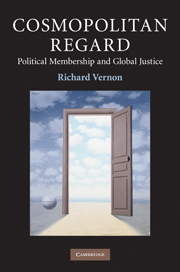
- Publisher:
- Cambridge University Press
- Online publication date:
- May 2010
- Print publication year:
- 2010
- Online ISBN:
- 9780511676369
- Series:
- Contemporary Political Theory


Cosmopolitan theory suggests that we should shift our moral attention from the local to the global. Richard Vernon argues, however, that if we adopt cosmopolitan beliefs about justice we must re-examine our beliefs about political obligation. Far from undermining the demands of citizenship, cosmopolitanism implies more demanding political obligations than theories of the state have traditionally recognized. Using examples including humanitarian intervention, international criminal law, and international political economy, Vernon suggests we have a responsibility not to enhance risks facing other societies and to assist them when their own risk-taking has failed. The central arguments in Cosmopolitan Regard are that what we owe to other societies rests on the same basis as what we owe to our own, and that a theory of cosmopolitanism must connect the responsibilities of citizens beyond their own borders with their obligations to one another.
‘In this imaginative and ambitious book Richard Vernon sets out an attractive and sophisticated contractarian account of 'cosmopolitan regard' that offers a rich and innovative approach to global justice.’
John Horton - Keele University
‘This clearly written book defends an account of patriotic concern that is compatible with the cosmopolitan ideal of equal regard for others. In defense of his own position, Vernon thoroughly and thoughtfully engages the extensive contemporary literature on this important question. The book can thus serve as a useful reference resource for students and scholars wanting to get familiar with the philosophical debates surrounding patriotism, membership and global justice.’
Kok-Chor Tan - University of Pennsylvania
'Richard Vernon’s book makes an elegant contribution to debates in contemporary political philosophy about the moral basis of our political societies and its implications for the duties we have to those who fall outside of our associative universes of belonging.'
Source: Criminal Law and Philosophy
 Loading metrics...
Loading metrics...
* Views captured on Cambridge Core between #date#. This data will be updated every 24 hours.
Usage data cannot currently be displayed.